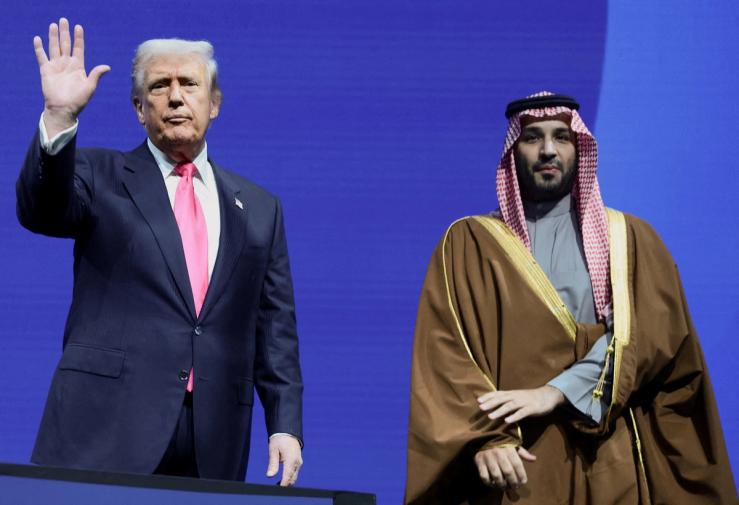The News
The second day of Saudi Arabian Crown Prince Mohammed bin Salman’s visit to Washington looked a lot like the first: plenty of fanfare and vows to boost the US in the AI race, but few details about the deals touted by the two countries.
The crown prince’s trip — including a glitzy White House dinner on Tuesday — marked a rebranding for a Saudi leader who was ostracized back in 2018 over his role in an operation that ended with the killing of a journalist. President Donald Trump’s embrace of MBS, as he’s known, continued Wednesday at a Kennedy Center business summit, where Trump described the US-Saudi bond as “among the most consequential in the entire world.”
The White House touted Saudi Arabia’s promise to increase its past $600 billion of investment promises to $1 trillion, also announcing a series of broad deals that includes a critical minerals framework and an AI agreement.
In addition to “a historic strategic defense agreement,” Trump on Wednesday touted a promise that the US would try to reach peace in Sudan and $270 billion in deals being signed by companies at the summit.
But even as attendees pushed for Saudi buyers to help ensure US technology is the building block for AI across the globe, specifics on some of the deals remain unknown — even for US lawmakers who met with the crown prince and other Saudi officials at an hour-long Wednesday reception on Capitol Hill.
Like his White House visit, the Capitol stop was a polished affair, with catered breakfast and a coat check. Nearly a dozen senior members of both parties attended, including House Majority Leader Steve Scalise, R-La., and the bipartisan leaders of the House Intelligence, Armed Services, and Appropriations Committees.
House Foreign Affairs ranking member Greg Meeks, D-N.Y., said earlier in the week that he’d hoped lawmakers would leave the meeting with more insight into the contents of an unspecified “defense agreement” between the US and Saudi Arabia.
But Rep. Brad Schneider, D-Ill., who co-chairs the Congressional Abraham Accords Caucus, said in an interview afterward that lawmakers did not discuss the agreement “in detail” with the crown prince. Neither the murdered journalist Jamal Khashoggi nor a potential civilian nuclear deal came up, he added.
Instead, they listened to the crown prince lay out “his vision for the region” and asked questions about “peace and future for Gaza commitment,” Schneider said.
“It was an exclusively forward-looking conversation,” Schneider said. “Everyone’s questions were really focused on a path forward to a new vision for the region, defeating extremism and creating a better future for all the people in the region.”
There was no Senate reception at the Capitol. But Sen. Joni Ernst, R-Iowa, another co-chair of the Abraham Accords Caucus, hosted the crown prince and the country’s ambassador to the US, Reema bint Bandar Al Saud, for a private meeting with lawmakers off the Hill Tuesday night, a person familiar with the plans told Semafor.
Senate Minority Whip Dick Durbin, D-Ill., and Senate Republican Conference Chair Tim Cotton, R-Ark., plus Sens. Tim Sheehy, R-Mont., Lindsey Graham, R-S.C., Jim Banks, R-Ind., James Lankford, R-Okla., Katie Britt, R-Ala., Jacky Rosen, D-Nev., and Rep. French Hill, R-Ark., were in attendance. Among the topics the senators addressed with bin Salman: Israel and Hamas, boxing out Iran and working with the Saudis on economic development.
House Judiciary Committee ranking member Jamie Raskin, D-Md., slammed the Washington meetings as “obsequious behavior” that “dishonors our Constitution.”
“Trump covered the homicidal Crown Prince in the kind of humiliating flattery he receives himself at Cabinet meetings,” Raskin told Semafor. “MBS’ welcome here in the Capitol has been equally humiliating for American democracy and depressing for people who believe in human rights.”
Know More
The summit was light on Wall Street players, with no big-bank CEO in attendance — though JPMorgan’s logo appeared on backlit screens of sponsors and Blackstone’s Steve Schwarzman, a longtime Trump ally, represented the world of private capital.
Instead, attendees focused largely on technology itself and its role in projecting US might abroad.
Sami Issa, CEO of GlobalAI, a US-based builder of data centers that announced a deal this week with Saudi Arabia’s sovereign wealth fund-backed AI company described the battle to export AI tech as “a race — are we going to win most of them or lose any of them?
“So we’re going to start with our allies, win those, and go beyond them. I think all of it should be on American technology,” Issa added.
The summit captured a shift in the kingdom’s economic and global aims that Wall Street has long felt, but Washington has internalized more recently. Saudi Arabia, once a nearly bottomless well of cash circulated around the world to buy influence and generate financial returns, now wants more tangible results back home — and to be a net importer of capital.
Thus, many of the deals announced this week were less about Saudi investments in the US than about the purchase of US goods and services that could help the kingdom build up a homegrown AI sector.
Notable
- Lawmakers on Capitol Hill are largely following Trump’s embrace of the Saudi crown prince, Semafor reported this week.
- Many of the pledges made during this week’s trip aren’t done deals quite yet, CNBC reported.
Burgess Everett contributed.

